Part 2
For anyone joining us late, I tweeted some smack about Star Trek: The Next Generation. Fellow blogger Alan Doane responded with a list of 21 TNG episodes he considered great. Always hungry for more to blog about, I took Alan's list as a challenge and decided to watch all the episodes and write about them. Links to the first two segments are above.
A note about SPOILERS (I put it in bold, italics, AND all caps, so you have truly been warned). These episodes are two decades old and I think most would not fault me for the spoilers to follow. I do want to warn you about them, however, because this particular crop of reviews is spoiler-heavy. And also because I don't usually accept the excuse that because something was released years ago that spoilers are okay. If it's new to me, then it's new to me. Unfortunately, the nature of these 4 episodes makes it pretty difficult to discuss what I liked or didn't like without some major spoilage. So you have been warned. Here There be Spoilers.
"Remember Me"
Season 4, Episode 5
Directed by Cliff Bole
Mere hours after the Enterprise picks him up at Starbase 133, Dr. Beverly Crusher's aging mentor Dr. Dalen Quaice disappears. Perplexed and worried for her old friend, Dr. Crusher enlists the aid of the crew to find the missing doctor, but to no avail. Not only has Quaice disappeared, but all proof of his existence seems to have been erased. The Enterprise computer holds no record of his boarding and Starbase 133 claims he was never there either. Not even Chief O'Brien remembers beaming him aboard. As more and more members of the crew look at Crusher as if she's been sampling her own pharmaceuticals, Beverly realizes Quaice's vanishing act is the tip of the iceberg. The Enterprise's crew quickly shrinks from the thousands to the hundreds to the dozens, and no one seems to think it's particularly strange except for her.
Eventually we learn it isn't Quaice or anyone else who's disappeared, but Dr. Crusher herself. Caught in a warp field experiment gone wrong, Crusher's fears of losing the important people in her life caused her to be trapped in a sort of pocket reality; a shrinking bubble that will implode and kill Crusher unless the ship's crew - with the help of the enigmatic recurring character The Traveler - can find a way to get her out.
"Remember Me" has a really cool, Twilight Zone vibe to it that pulls you in quickly and keeps you guessing (unless you read this review, I suppose, in which case you won't have to guess too much). Dr. Crusher's confusion and frustration with the rest of a bizarrely oblivious crew is a nice departure from the show's usual tone.
While TNG episodes focusing on a specific character tend be hit-and-miss for me, I enjoyed following Dr. Crusher around. I don't think I'd really given a lot of thought to her specific mannerisms before watching "Remember Me." Two things stood out. First, Crusher never seems to question her own sanity. As turbulent and confusing as the world around her becomes, she never lets her resolve waiver. Second, "Remember Me" is the first time I ever detected any similarities between Crusher and her predecessor Bones. Of course, Beverly has no Spock to debate with (while Data might have the intellect to fill Spock's shoes, he doesn't have the arrogance). But as the crew in her pocket reality shrinks, soon the only thing Beverly has to talk to is the ship's computer, and her frustration and occasional insults couldn't help but remind me of McCoy.
While I enjoyed "Remember Me," it's one of two episodes in this segment that slips and falls in just one minor place, but in a way that I think truly does take away from the story.
The Traveler is creepy. The Traveler is meant to be an enigmatic, riddling and largely benevolent advanced being. He is meant to be something like the Phantom Stranger of DC Comics, or even Marvel's The Watcher. But he really, really, no Internet-clever-snark intended, just comes of as a space kiddy-stalker. Everything about him - his slow and sleepy speech, his cow-like stare, and the simple fact that he seems to have little interest towards anyone on the Enterprise beyond young Wesley Crusher - makes you think his main reason for visiting the ship was because the court told him he had to tell everyone in his solar system he was a sex offender or he'd lose his parole.
But all kidding aside (and I'm hardly kidding), "Remember Me" is a suspenseful, solid episode.
"Future Imperfect"
Season 4, Episode 8
Directed by Les Landau
When Riker leads an away team to the surface of a planet in search of a secret Romulan base, he and the rest of the team are knocked out by gas. Unlike the rest of the team, Riker wakes up sixteen years later. He learns that the gas to which he was exposed causes chronic memory lapses. He doesn't remember that he's been the captain of the Enterprise for years, that Data is his first officer, that he married and had a son, or that the Federation is the middle of reaching an historic peace accord with the Romulans.
Eventually, Riker figures out the charade, or so he thinks. He believes he is on a Romulan holodeck and that the illusion was created to trick Riker into revealing the location of a secret Federation base. The illusion of this reality fades away once he confronts the Romulans he believes to be his captors, but he learns the boy who acted as his son, Ethan (though he was named Jean-Luc in the future illusion), appears to be as much of a prisoner of the Romulans as Riker.
Using his knowledge of the Romulans' base, Ethan helps Riker stage a daring escape, but eventually the boy's story proves false. Not only was the future "Captain Riker" world a ruse, but the secret Romulan base was just as much of an illusion. Ethan is in fact Barash, the apparent lone survivor of an alien species, left in the cavern of a barren world who wants nothing from Riker but connection with a real person.
The red herring of the future Captain Riker and all that came with it is the best, most fun thing about this episode. It was an impressive way for the creative team of TNG to turn viewer expectations on their head. I doubt any regular TNG viewers would be fooled very long into thinking Riker's future was a genuine one. The constant computer lag is a big hint, of course, as well as the very existence of holodecks in the show's mythology. But the fact that the Captain Riker future was an illusion trapped in an illusion was refreshing, and as always it's nice to see alternate reality versions of the crew. In fact, if I'm not mistaken, almost the complete plot of "Future Imperfect" minus the double-reveal of the illusion within the illusion, was copied for an episode of Star Trek: Deep Space Nine, with the Dominion replacing the Romulans.
But again, like "Remember Me," there is just one little thing that shouldn't take away from the rest of the episode but does. The reveal of Barash's true form at the end of the show is disappointing and just plain lame. He looks like a kind of grey alien from The X-Files or general UFO myth. Everything about his design seems to be a loud, braying broadcast from the crew that designed it, "ATTENTION, WE WEREN'T EVEN FUCKING TRYING WITH THIS ONE!" I would not say it ruins the episode, but it's just kind of jarring. You're sitting there, satisfied with an hour well spent, and then there's this ugly spud of a thing someone slapped together. It would make a kick-ass Halloween costume maybe, but on a television show, not really. You can be the geekiest geek in geektown. You could be a 55-year-old virgin with a dog named Chewie, and three cats named Legolas, Picard, and Firelord respectively. Your ring tone could be nothing but George Takei saying "Han shot first...Han shot first...," and saying it in Klingon, and you'll still be embarrassed if someone walks in on you watching the end of this episode and sees that ET reject providing the emotional climax for your past hour.
As fun as it is for me to trash the poor little guy, let me reiterate, "Future Imperfect" is a good, fun episode. As much as I may or may not be exaggerating about Barash's impact, I do think his physical reveal serves as a good example of how one little thing can throw a monkey wrench in the warp core.
"Clues"
Season 4, Episode 14
Directed by Les Landau
While investigating an uncharted M class planet, what appears to be a wormhole renders the entire Enterprise crew - save Data - unconscious. When they awake, Data informs them they were only knocked out for 30 seconds, though the wormhole threw them a day's worth of travel away. Data suggests sending an unmanned probe to back to the M class planet because of the danger of the wormhole. Soon, however, minor mysteries sprout up suggesting the crew was out for much longer than 30 seconds. The probe returns with images and data of a gas giant instead of the M class planet originally detected. A crop of plant samples being tended to by Dr. Crusher show an entire day's growth. People like Chief O'Brien and Worf show up in sick in bay with unexplained injuries. Counselor Troi suffers horrifying hallucinations. Eventually, Geordi proves that Data tampered with both the probe and the ship's chronometer. Data refuses to cop to the charges but won't defend himself either.
When a frustrated Picard returns to the planet, we learn that Data's deception was meant for the safety of the crew. A xenophobic, energy-manipulating race - the Paxans - protect themselves by stopping any outside species from even learning of their existence. They simulate a wormhole-like effect which stuns any approaching ship's crew and then they transport the ship safely away in their sleep. Most crews awaken believing a wormhole sent them deeper into space, but most crews don't include self-aware androids. Immune to the Paxans' stuns, Data initially revived the crew before the Paxans could transport the ship away. Once the Paxans threatended to destroy the ship, Picard suggested that the Paxans wipe the crew's memory clean. Since Data was immune to the Paxans' abilities, Picard ordered Data to keep the knowledge of their race a secret for the rest of his days. Confronted with the Enterprise a second time, the Paxans are initially convinced they must destroy the ship. Picard convinces them to give his crew a second chance so they can get rid of the irresistible clues that lead them back to the Paxans.
"Clues" is filled with engaging "minor mysteries" (as Picard often puts it). Though I think what I enjoyed most about the episode was Data. Whatever criticisms can be laid against Star Trek: The Next Generation or any of the franchise's various incarnations, I think it's safe to say casting is one of their strong points. A Data without Brent Spiner is unimaginable, and "Clues" is a wonderful example of why. While Data does not act particularly different, he manages to seem not only deceptive, but downright menacing at times. And his little smirk at the end of the episode is priceless.
There are minor but-hey-waitasecond problems I have with the episode; the most glaring of which is why Data chooses to keep changing the ship's clock when it seems like it would be easier to just tell the crew they were out for an entire day. It is, after all, the time difference that initially gives him away. Not to mention that it seems like sooner or later they're going to run into another ship or starbase who's going to tell them, "Dude, your clock's, like, two days wrong." Then there's the question of Counselor Troi who suffers frightening visions after her body is taken over by the Paxans. I mean, they can change clocks and dust off fingerprints and tamper with probes all they want, but how can they get rid of Troi's psychic terror?
Initially, I also had a problem with Picard acquiescing not once, but twice, to the memory loss scheme and putting his crew's lives in the hands of the Paxans; a group of folks he knows very little about, and among the few things he knows is that they're assholes who knock people out just for looking at their backyard.
Now though, I don't know. After watching not only the episodes on Alan's list but quite a few others, I have an easier time imagining he would do it not only for the sake of his crew, but for his commitment to the Prime Directive (even though he manages to break that, like, always).
"The Host"
Season 4, Episode 23
Directed by Marvin V. Rush
While transporting the renowned Trill negotiator Odan to a peace negotiation, his shuttle is attacked and Odan is critically injured. Dr. Crusher, Odan's lover, learns upon examining the negotiator that his species is a symbiotic one. Their humanoid form is merely a host for parasitic beings that carry the true consciousness of the individual. The Enterprise contacts the Trill for a replacement host body, but the Trill are too far away to arrive in time. In order to buy Odan time and complete the negotiations, Commander Riker agrees to act as host for Odan. Fighting conflicting feelings of love for Odan and those of brotherly friendship for the body he inhabits, Crusher eventually gives in to love. Odan succeeds in negotiating a peace before collapsing. The Trill arrive just in time to save Odan, but to Crusher's disappointment, Odan's new host body is female. The episode ends with Crusher telling Odan she simply cannot deal with his constant changes, with a disarmingly passionate kiss (though not on the mouth).
I have to admit that when I first saw this episode, I didn't like the ending. I felt I was being preached to and I didn't like what I was being preached. I'm all for positive LGBT messages, but while most of the successful social messages we find in Star Trek episodes can find easy analogies in the real world, I couldn't see the real connection here. I felt like I was meant to be disappointed in Crusher's refusal to continue her relationship with Odan, and that didn't seem fair to me. When would this situation, or something truly comparable to it - a woman falling in love with a man who becomes another man and then becomes a woman - happen here on a true Earth? And while accepting homosexuality in others is one thing, at first I felt like I was meant to want Crusher to forcibly change herself into a homosexual at the end of "The Host," and that doesn't seem particularly fair or open-minded to me, just as I wouldn't want a gay character to feel forced to act against his or her nature.
But I've changed my mind since. Certainly, "The Host" challenges our perceptions of sexuality and gender, but I think overall it doesn't mean to do that just by asking us to rethink homosexuality and/or transsexualism; it means to challenge our notions of what the boundaries of love truly should be, if any.
To be continued...

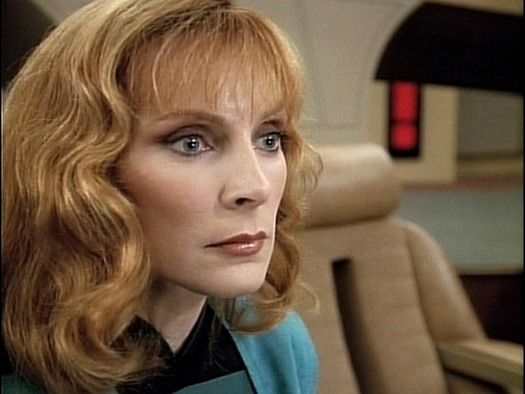
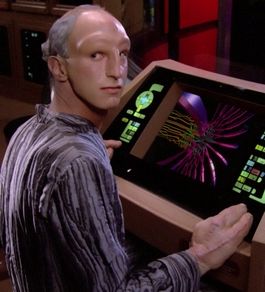
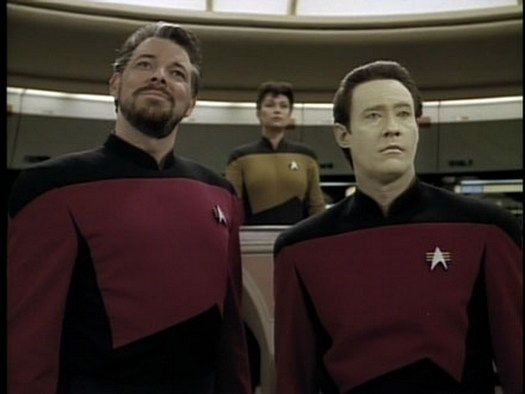
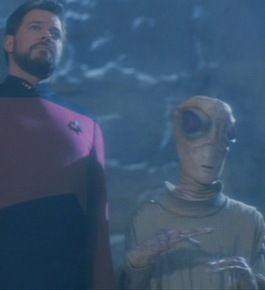
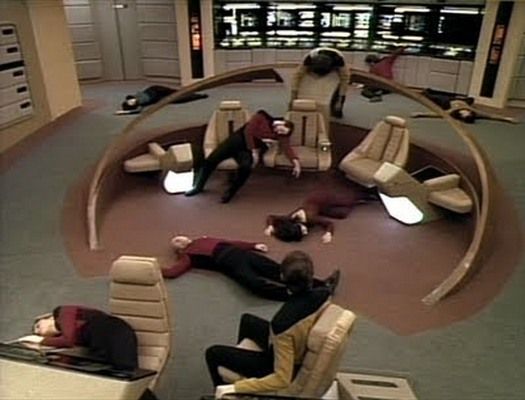

1 comment:
Great batch of episodes, great batch of reviews! My only quibble is your comment about Barash -- I think he is purposely hideous in order to contrast with the handsome young man Riker thought was his son. I agree the character design could have used a bit more sophistication, but I do think the initial revulsion viewers feel upon the reveal is pretty effective nonetheless.
Post a Comment